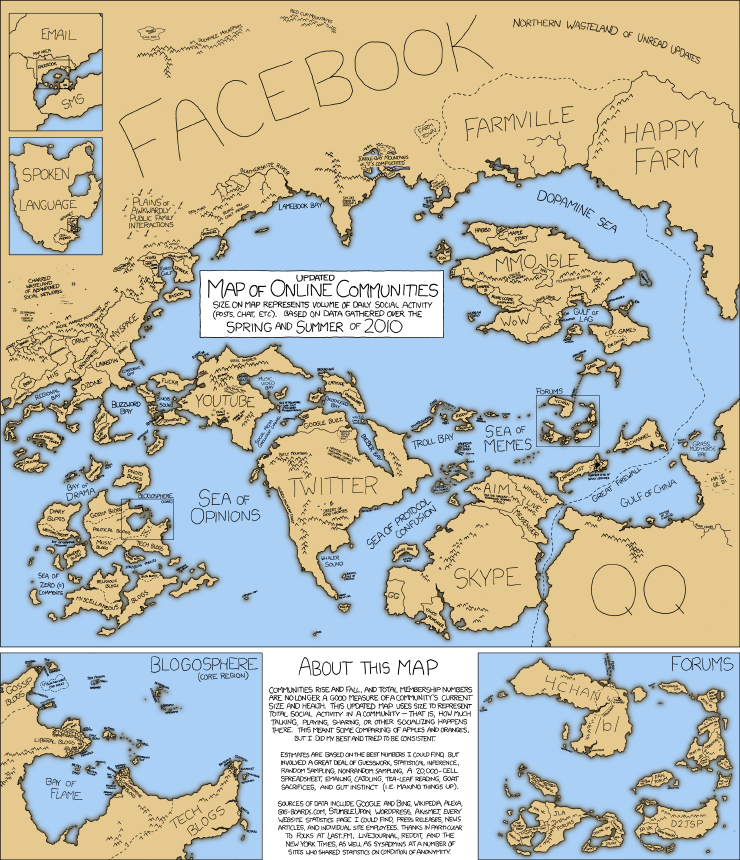This is the first in an open-ended series on finding and engaging with new audiences on the internet. If you have experience working with or presenting content through new venues on the internet, please get in touch! Your perspective would be welcome on The Public Medievalist!

The internet is a wild place. It’s a marvel of our era, a place where we are “capable of accessing the entirety of information known to man” which we then use “to look at pictures of cats and get in arguments with strangers.” This quote succinctly illustrates the beautiful potential of the internet, as well as its inherent silliness and toxicity. It comes from one of the most interesting– in all senses of the word– sites on the internet: Reddit.com.
As a public historian, I am keenly aware that there is not one public, but many publics. And each sphere in which we operate as public historians is only reaching out to a pretty-specific subset of that public. Failing to recognize this can lead you to conclude that everyone is like those of your public; if you’re a college professor, you begin to assume all young people are like your students. If you work in an art gallery you begin to think people are as erudite as you. If you work in retail you begin to feel that all people are hateful monsters who want to watch the world burn.
As humans we are very good at constructing these sorts of echo-chambers for our lives; we gravitate towards those who share our beliefs and values, we join communities of like-minded individuals, and even choose careers and life-partners based upon shared rather than contrasting perspective. But, as public historians, if we are truly interested in reaching The Public at Large beyond our university or museum, and if we are interested in participating in broader discourses—and maybe, if we’re lucky, shaping them a little—then we have to actively reach out to those who are different from us.
The internet makes this both incredibly easy and incredibly hard. It’s easy because, well, you’re reading what I have to say right now, right? Anything put on the internet is, ostensibly, readable by anybody (okay, well, let’s not talk about China). But on the other hand, the internet multiplies our abilities to construct petty kingdoms of opinion. Someone says something we don’t like? Never hearing from them again is literally a click away.
I was pleased to see that my last article, on Sansa Stark and sexual violence in the Middle Ages, was doing quite well. After a few days of friends and friends of friends liking and sharing on Facebook and Twitter, it had been seen by about 1,000 people (or, at least, 1,000 times). By academic publishing standards, that is well into its paperback release. But by popular standards, doesn’t even register. I wanted to show it to a wider audience, beyond just friends and friends of friends.
Enter Reddit.

Reddit.com, which styles itself as “the front page of the internet” is an aggregation site. Go there, and you can find people sharing articles from all over the web on any topic imaginable—from breaking news articles to recipes to photos of their cats to technology specs, to badly-drawn comics, to photos of their cats to photos of their cats. And reddit is enormous—in May of 2015 Reddit had 172.7 million people visit (or, at least 172.7 million different computers). If you want it to be read, one way is to put it on Reddit.
And unlike getting an article in an academic journal or The New York Times or even Huffington Post, there is no one editor to convince that your article is good, or that it will push paper.
Instead, there are millions.
Posts on reddit are vetted (more or less) democratically. For every article there, a user can “upvote” articles they like and “downvote” articles they don’t. Those that get a lot of upvotes float closer and closer to the top of the list. Those that don’t, sink like stones.
Like all such democratic systems, it is both extremely fair and wildly unfair. Things get upvoted or downvoted for seemingly arbitrary reasons. An article posted by one user that flops could be posted by another a day later and reach the front page. And ultimately, it is what is popular rather than what is right that wins.
And worse, it is a hive of scum and villainy. Like many social sites, the comments are notoriously full of vicious idiots looking to start tiny wars. It is well-known that many sections of Reddit are havens for of retrograde young males of an anarchic-libertarian political bent. And it is democratic, which means the dominant group’s voice is heard the loudest, which in this case skews towards young white straight cis middle-class American males.
So, in short, submitting your work to Reddit is like having it peer reviewed by a hundred and seventy million angry howler monkeys.
But oh, the eyeballs. The potential for outreach!
So, I submitted my article to Reddit—to two subsections I felt it might be well-received: one devoted to women’s issues and feminism, and another for Game of Thrones fans. On the women’s subreddit, it was upvoted a few times, received a few snarky comments, and then fizzled.
On the Game of Thrones section, it started a war.
As the dust has settled at the time of writing, there it has received 141 net upvotes (meaning 141 more up than down), and 119 comments. And that article has been read over 15,000 times in three days. It has been derided, torn apart, wildly misinterpreted, and outright dismissed. Apparently I am a terrible writer, a terrible man, a terrible person, and a terrible scholar (I’ve put a quick little response to the “best” comments at the bottom of this article, here).
But at the end of the day, 15,000 people have read that piece of work. To me, that’s incredible. And while many—maybe even most—disagreed with it, there are a lot more people who read it and, I hope, found it illuminating than had done before I posted it to the site.
Thus, Reddit can be an incredible tool (despite also being full of them) for someone trying to genuinely reach out to audiences—especially to those audiences who might not already hear what we say and agree. That being said, I’ve created a few handy rules for the internet public historian looking to get their work read on reddit and not be driven to drink.
The Public Medievalist’s Rules of being an historian on Reddit
- Do not take your number of upvotes as an indicator of the quality of your work, for that way leads to madness.
- Do not take the comments as representative of a general opinion of your work, for that way leads to madness. Most readers are silent, and the silent majority is kinder than the vocal minority.
- Know the subreddit your are posting to. Some have a more-academic tone and more respectful discourse. Others are flaming cultural trashheaps. Start with /r/askhistorians; it is carefully moderated and great. /r/history is not bad either, nor is /r/medieval and /r/middleages. Venturing beyond this is reaching out to a very different public, for better and for worse.
- If you choose to read the comments, gird your loins and pour yourself a drink. Read all comments as though it were being written by a petulant teenager.
- They are wrong. No exceptions.
- Only ever consider replying to a comment if the commenter is being reasonable and respectful.
- Do not feed the trolls. There are many who are there simply to pick fights for their own amusement. The only way to win that game is not to play.
- This is not like being in a class; you have no more authority than anyone else. You are not there as the teacher. You are not the moderator of the forum. The best you can do is be part of the conversation.
- Your work will be misunderstood. This is normal. Do not correct the reader. Correct your work (and only if it’s really needed).
- Most people do not come there to have their minds changed, but their ideologies reinforced. That said, we don’t do it to change everybody’s mind.
- If you were not born white, male, straight, cis, middle class, American, or any other marker of social dominance on the internet, all of these rules apply double.
And now, in violation of all the above rules, click here for my wildly sarcastic response to the Reddit critics of my most recent article: [NSFW: language, idiocy, a wildly unprofessional public medievalist]





Very good post, got me hooked up on reddit. I especially like
/r/askhistorians, which I think is well moderated and filled with
people, who show a lot of expertise and professionality – and only a few
trolls.
It’s a shame, that reddit is almost unknown in Germany, or
else I might have stumbled in there earlier. All the enlightenment I’ve
missed…
If “…submitting your work to Reddit is like having it peer reviewed by a hundred and seventy million angry howler monkeys,” then I submit for your approval:
http://nextshark.com/howler-monkey-testicles-study/